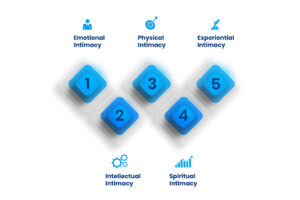Have you ever wondered why there are people who can be emotionally attached easily, and some people cannot even allow anyone to get into their hearts? Here, the idea of Intimacy vs Isolation, a stage of psychology, comes into play. This step describes the experience of the internal conflict many people experience during the initial adulthood period. The longing to develop intimate and significant relationships and the dread of exposure and denial. This article will discuss intimacy, isolation, the meaning of intimacy. It includes the effects of isolation and how Erikson’s theory influences the thought process of relationships.
What Is Intimacy?
Intimacy is more than the mere act of being next to someone; it is being able to open up to someone and get to know their deepest thoughts, feelings, and fears. It is an emotional attachment that is founded on trust, honesty, and mutual respect.
During a loving relationship, the partners are emotionally available to one another. They speak out, solve disputes in a compassionate way, and demonstrate regular concern. Intimacy enables two individuals to develop both as individuals and as a unity to bring about a balance between independence and unity. Such of bond does not just happen in romantic relationships, it may happen in friendship, family ties, and even between the mentor and the mentee.
What Is Isolation?
Isolation is on the other end of the spectrum, emotional withdrawal, and refusal to have intimate relationships. Isolated individuals can be lonely with other people around. This usually occurs when one is afraid of being vulnerable or rejected and would go to the extent of constructing emotional walls to shield themselves.
Isolation does not always imply physical solitude. A person may be in a relationship and still feel cold. This emotional isolation may cause sadness, self-devaluation, and a lack of trust in others. In the long run, unresolved isolation may also cause anxiety, depression, or failure to establish new relationships.
Types of Intimacy

Intimacy comes in many forms. To comprehend Intimacy vs Isolation in full, one should realize that intimacy is not only physical affection. The important forms of intimacy are as follows:
Emotional Intimacy
The freedom to express yourself and your personal feelings and experiences without fear of being judged.
Intellectual Intimacy
When people interact due to common ideas, interests, and discussions, they arouse thought and respect for each other.
Physical Intimacy
This involves tender gestures like hugging, hand holding, or even sexual intimacy, which generate warmth and coziness.
Spiritual Intimacy
Having common beliefs or values or a mission that makes people stronger.
Experiential Intimacy
Developed during the experience, i.e., when traveling, working on some projects together, or helping one another out of difficulties.
Intimacy vs Isolation Examples
1- Emma and Alex have been dating for two years. They express their anxieties, deliberate on the strategies, and solve disputes amicably. This is intimacy since both the couple are emotionally safe.
2-Daniel does not want to express his emotions, and he tends to isolate himself when someone attempts to get too close. He is not committed because he has been heartbroken in the past. This shows loneliness, and fear does not allow for any meaningful connection.
3-Sarah has limited close friends with whom she feels she is understood. But once the work stress builds up, she starts to push other people away. This depicts the fact that there is possible isolation that can be temporary because of emotional burnout.
4-It can be seen that Intimacy vs Isolation is not a fixed condition, but a balance that people constantly have to deal with in their lives.
Intimacy vs Isolation Stage
The sixth stage of the psychosocial development theory presented by Erik Erikson is the Intimacy vs Isolation stage, which is likely to occur in the period of young adulthood (1840 years old). At this age, people are oriented towards the establishment of meaningful relationships and the establishment of emotional intimacy.
Erikson postulates that effective completion of this stage results in a good relationship and the capacity to love. Nevertheless, the inability to realize intimacy can lead to emotional deprivation, alienation, or even rejection.
This is a continuation of the last phase, Identity vs Role Confusion, whereby people know who they are. The lack of self-awareness and emotional maturity can lead to the instability of relationships or even to superficiality.
Virtue of Intimacy vs Isolation
Once one manages to go through this stage, they obtain the virtue of love. This is not just speaking of romantic love, but the compassion, empathy, and emotional bonding in any given relationship.
The love virtue is the capacity to love another human being and, at the same time, not forget who one is. It brings about equilibrium- people can be themselves without being afraid of becoming who they are. Individuals who have mastered intimacy are emotionally stable, possess superior communication abilities, and have more satisfaction in their lives.
Intimacy vs Isolation: Negative Outcome
Loneliness and detachment are some of the issues that people may have when the stage of Intimacy vs Isolation is not effectively solved. The following are some of the possible adverse consequences:
- Emotional Withdrawal: Escapism of emotional intimacy in the fear of being vulnerable.
- Commitment Problems: Brief relationships.
- Low Self-Esteem: Feeling of incompetence or the fear of being rejected.
- Depression and Anxiety: Depression due to isolation or not being connected.
- Dependency or Avoidance Patterns: Clinging to others to get confirmation or avoiding relationships altogether.
The consequences of these could cause obstacles towards the development of healthy and close relationships, where the emotional healing process is necessary to ensure the growth and bond.
Young Adulthood Intimacy vs Isolation
The period of young adulthood is the best time to experiment with intimacy. At this stage, people are building careers, social networks, and love lives. The issue of autonomy and intimacy comes into play.
Young adults who manage to achieve intimacy have the likelihood of enjoying emotional stability, social support, and satisfaction in life. They get to understand the importance of being vulnerable as a strength rather than a weakness. On the contrary, the struggling individuals might spend too much time on self-protection and self-reliance to the extent of being emotionless.
To build sustainable relationships, young adults should learn to be self-aware, communicate efficiently, and trust each other. Setting up healthy boundaries also prevents a loss of identity in relationships.
Intimacy vs Isolation Erikson
Intimacy vs isolation is a concept proposed by Erik Erikson, who is a well-known developmental psychologist, and is one of the eight stages of psychosocial development. All of the stages are crucial psychological conflicts, which define the personality and emotional state of a person.
Moreover, without seeing the problem of identity over previous phases, people may have a fear of losing themselves in a relationship, which may result in avoidance or withdrawal of emotions.
Success at this stage leads to intimacy and failure to success leads to isolation, although this was the view of Erikson. His theory is still applicable to the present day as it assists psychologists and people to comprehend emotions.
Erikson’s Intimacy vs Isolation
The framework created by Erikson emphasizes the fact that emotional development does not end at the adolescent stage, but goes on to adulthood. The Intimacy vs Isolation stage also assists in understanding why some adults find long-term relationships very easy, whereas others experience recurrent emotional estrangements.
Individuals who are successful at intimacy have mastered the earlier stages of development, like trust, autonomy, and identity. They are not afraid of being open with other people, and they do not lose themselves in a relationship. Conversely, those who are not able to attain intimacy could be lonely and afraid of being vulnerable.
Final Thoughts
Intimacy vs isolation is a universal struggle that defines much of early adulthood. It’s about learning how to connect without losing oneself and how to love without fear. Building intimacy requires courage, vulnerability, and self-awareness, but the reward is genuine emotional fulfillment.
Whether through romantic bonds, friendships, or family ties, intimacy gives life meaning. On the other hand, isolation can lead to emotional emptiness and disconnection. Understanding this balance is key to forming authentic, intimate relationships that enrich our lives and nurture our emotional well-being. To get better guidance and treatment, you can reach out to MAVA Behavioral Health!
FAQs
What is the Intimacy vs Isolation stage?
It is the sixth stage in the psychosocial development of Erik Erikson, which is all about forming intimate relationships during young adulthood.
At what age is Intimacy vs Isolation done?
The phase usually happens at the age range of 18 to 40, when people have the highest chances of developing romantic relationships or long-term relationships.
What are the consequences of Intimacy vs Isolation?
Love, trust, and emotional intimacy are some of the positive consequences. The consequences of this are negative loneliness, fear of commitment, and social withdrawal.
What can one do to reach a point of overcoming the isolation?
Often, the key to reducing isolation and creating intimacy can be self-awareness, establishing trust over time, and finding authentic emotional connections with people.









